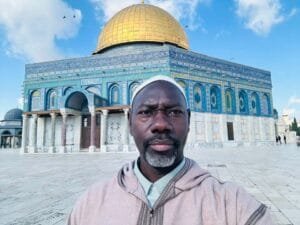Kenyan planned 9/11-style attack after training as pilot — US

Akeem Alao
The Federal prosecutors in Manhattan have charged a Kenyan man with plotting a Sept. 11-style attack on a building in an American city, according to a newly unsealed federal indictment.

According to the prosecutors in Manhattan, the man, Cholo Abdi Abdullah, 30, was an operative for the Shabab, a Somali terrorist group that has been described as Al Qaeda’s largest and most active global affiliate.
“Before his arrest, Mr. Abdullah had been making preparations in the Philippines to hijacka an airplane and crash it into a building in the United States,” the prosecutors said.
The said he was acting under the direction of a senior Shabab commander who planned a deadly 2019 attack on a hotel in Nairobi, Kenya.
“This chilling callback to the horrific attacks of Sept. 11, 2001, is a stark reminder that terrorist groups like al Shabab remain committed to killing U.S. citizens,” Audrey Strauss, the acting U.S. attorney in Manhattan, said in a statement.
Bruce Hoffman, a terrorism scholar at the Council on Foreign Relations, said the indictment was the latest reminder that Alu Qaeda and its affiliates remain a threat to America nearly two decades after terrorists brought down the Twin Towers in Manhattan and hit the Pentagon with commercial aircraft.
“This is now very hard evidence that we may have short memories, but Al Qaeda has a very long one,” Mr. Hoffman said. “They’re convinced that they can throttle the global economy by once again targeting commercial aviation, which is why they keep coming back to this tactic.”
Mr. Abdullah began the process of enrolling in a flight school in the Philippines in 2016, received training and ultimately completed the tests necessary to obtain his pilot’s license, according to the indictment.
He also researched methods of hijacking a commercial airliner, such as how to breach a cockpit door from the outside, the indictment charged.
In addition, the indictment says Mr. Abdullah did research about the tallest building in a major U.S. city and sought information about how to obtain an American visa. The indictment does not identify the city or the building.
Mr. Abdullah, who was arrested by the Philippine authorities last year, was brought to the United States on Tuesday, the authorities said, and he was arraigned in Federal District Court in Manhattan on Wednesday.
He pleaded not guilty to the six-count indictment, and a magistrate judge, Robert W. Lehrburger, ordered him detained.
Mr. Abdullah’s lawyer, Jill R. Shellow, said she had no comment after the hearing.
The charges against Mr. Abdullah include conspiring to murder Americans, to commit aircraft piracy, to destroy aircraft and to commit acts of terrorism transcending national boundaries. If convicted, he could face life imprisonment on some counts.
Mr. Abdullah is the second Shabab operative to have been arrested while taking flying lessons in the last two years: Another was arrested more recently in an African country, The New York Times, quoting intelligence officials, reported in March.
The Shabab, a radical Islamist insurgent group in Somalia that swore allegiance to Al Qaeda in 2012, has tried to expand its reach, counterterrorism officials have said.
Prosecutors said the Shabab recently embarked on a string of attacks in response to the decision by the United States in 2018 to move its embassy in Israel to Jerusalem, including the bombing of a luxury hotel in Nairobi in January 2019 that killed 21 people.
The group has carried out attacks on American targets, including a hit on an air base at Manda Bay, Kenya, in January, which killed three Americans.
“Shabab is a very real threat to Somalia, the region, the international community and even the U.S. homeland,” Gen. Stephen J. Townsend, who heads the military’s Africa Command, told a House committee in Washington in March.
Top Pentagon officials and military commanders argued against President Trump’s decision earlier this month to pull most of the roughly 700 U.S. troops in Somalia out by early next year.
America and Somali officials have expressed concern that an abrupt U.S. withdrawal could destabilize security in Somalia as the country heads into elections early next year, handing the Shabab tactical and propaganda victories.
Pentagon officials insist they will simply shift training and counterterrorism operations to neighboring Djibouti and Kenya, but commanders say both operations are more difficult when not carried out on the ground in Somalia itself.
The charges were announced by Ms. Strauss; John C. Demers, the assistant attorney general for national security; William F. Sweeney Jr., the head of the F.B.I.’s New York office; and Dermot F. Shea, the New York City police commissioner.
The indictment does not identify the Shabab commander who it accused of directing Mr. Abdullah in the hijacking plot, though it made it clear it was the same individual who the United States believes planned the bombing last year at a hotel in Nairobi.
On Jan. 15, 2019, Shabab sent a suicide bomber to detonate an explosive device in the lobby of the hotel, the DusitD2. One American, Jason Spindler, was among the dead.
When the World Trade Center attack occurred on Sept. 11, 2001, Mr. Spindler, who worked in finance in New York, had volunteered to help at the scene.
Tricia Bacon, a former State Department counterterrorism analyst who now teaches at American University, said the charges unsealed on Wednesday also suggested the Shabab is giving Kenyan operatives more authority to plan and launch terrorist operations, as they did in the 2019 hotel attack in Nairobi.
“We really hadn’t seen them relinquish authority in that kind of way in the past,” Professor Bacon said.














